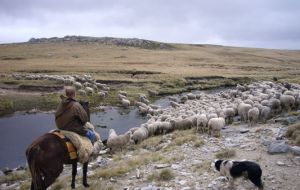MercoPress. South Atlantic News Agency
Falklands' farms go green; 40% organic status by 2010/11

TEN Falklands farms have registered to convert their farm production units to internationally recognised organic status. Should all go well this will mean nearly 40% of the Falkland Islands will have organic status by 2010/11.
Agricultural Advisor Ian Campbell from Falkland Islands Government Department of Agriculture said the reason for the move is, "It is hoped that premiums will be paid for organic wool and meat in the future as it is now around 15%. There are accreditation costs they need to cover but it is hoped by them that the overall effect is an increase in farm profitability." He said: "I guess people are very interested in organic food and fiber for what they see as ethical and health reasons and are prepared to pay extra for it. For many parts of the world due to livestock and crop diseases, and the pressure to earn the most money out of expensive and limited land resources is high, so it is difficult to produce organic products. "The Falkland Islands is in a unique position as it is largely untroubled by a lot of these issues, farming is nearly organic anyway and the management changes made by farmers to ensure they adhere to the strict standards are relatively minor." The main change the farms will have to make is to forego the use of artificially synthesized products like sheep drench or cattle insecticides or even synthetic fertilizers. They will then need to find alternative methods of solving the issues these chemicals would otherwise be used to solve. Director of Mineral Resources Phyl Rendell noted, "Wool from the majority of these farms will be accredited organic in 2010/11, while farms involved in organics previously will have wool available for sale with organic status earlier than this." The Islands are also looking at organic meat. Agricultural Department Senior Agricultural Advisor, Mac McArthur, recently attended an organic farming conference in Sao Paulo, Brazil, in October to learn more about organic production systems. Mrs Rendell said, "Mac gained useful expertise that will be valuable when assisting farmers with conversion plans." Australian organicsAustralian organic woolgrowers are being called upon to help UK retailer Marks & Spencer go 'green'. As part of a marketing strategy, Marks & Spencer is moving to making more of its product lines environmentally friendly. Asked by Kelly Penfold for www.wool.comif organic fibers are a fashion trend or a long-term customer desire, Graham Burden, who is Marks & Spencer sustainable textiles and cotton specialist, says the answer is still unclear: "At Marks & Spencer we are treating it as a strategy. If my customer says 'I want organic', I have to find it," he says. "More and more we are reading about climate change and more and more people want to know how their clothing is made. It's too dangerous to move all our clothing to organics because of the risks with supply. At the moment demand for organic fibers virtually equals supply? "Demand for organic wool is coming from countries that have embraced organic living – places like Sweden, Switzerland, the Netherlands, Germany and Austria," By Lisa Johnston – SeAled PR - Stanley




Top Comments
Disclaimer & comment rulesCommenting for this story is now closed.
If you have a Facebook account, become a fan and comment on our Facebook Page!